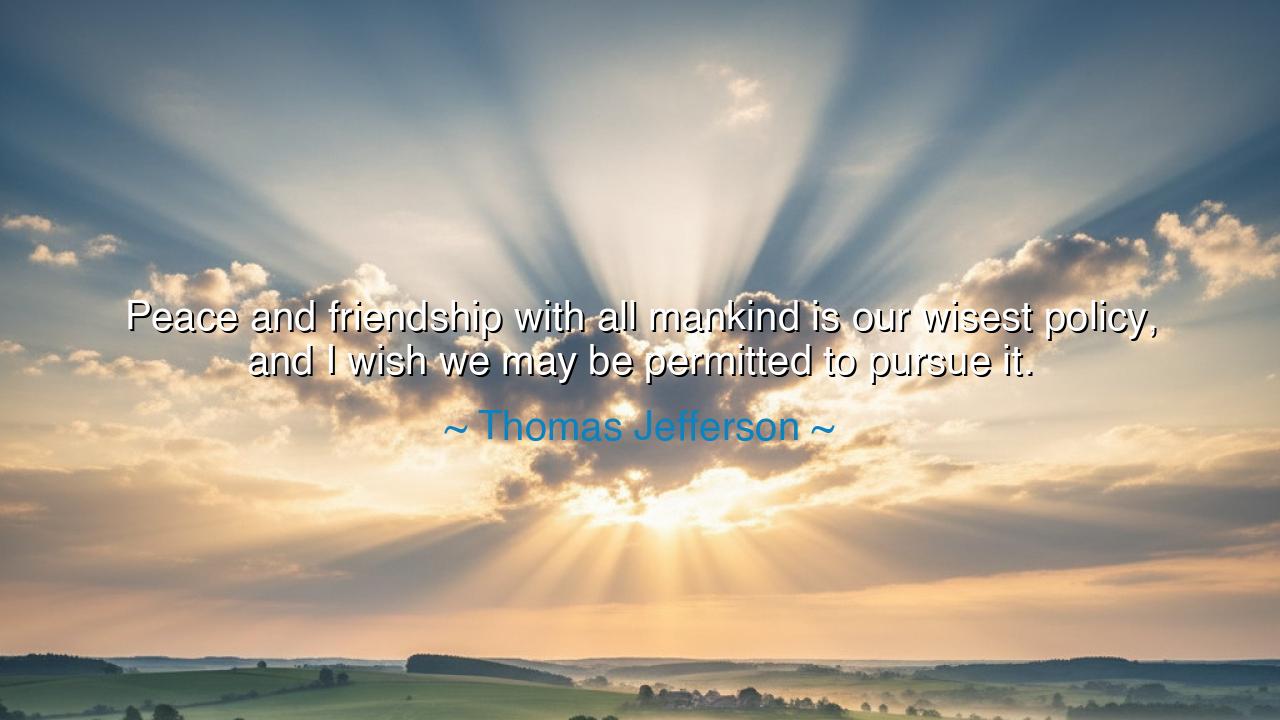
Peace and friendship with all mankind is our wisest policy, and I
Peace and friendship with all mankind is our wisest policy, and I wish we may be permitted to pursue it.






“Peace and friendship with all mankind is our wisest policy, and I wish we may be permitted to pursue it.” Thus wrote Thomas Jefferson, a founder among founders, a man who bore both the weight of his nation’s birth and the longing for its peace. His words echo across centuries like the toll of a great bell—clear, solemn, and filled with hope. In this single sentence, Jefferson reveals the essence of true statesmanship: that the highest form of power is not conquest but peace, and that the truest expression of greatness is not domination, but friendship.
The origin of this declaration lies in Jefferson’s first inaugural address in 1801, spoken at a time when the young American republic was fragile and divided. The fires of revolution had cooled, yet the embers of partisanship still glowed fiercely. Abroad, the world was in turmoil—Europe ravaged by war, empires clashing for supremacy. And yet, Jefferson stood before his people not to call for arms, but for amity; not to summon vengeance, but to inspire unity. He urged the United States to stand as a nation guided by reason, not passion—by wisdom, not fear. “Peace and friendship with all mankind,” he said, must be not only a diplomatic stance, but a moral creed.
In these words, Jefferson was not naïve to the realities of conflict. He had seen war; he had fought tyranny. But he knew that peace, though harder to win, yields fruits far sweeter than victory won by the sword. He understood that a nation, like a man, cannot thrive when it lives in constant hostility. Friendship, both among individuals and among nations, is the soil in which prosperity, understanding, and progress take root. Without it, even the mightiest power stands upon sand. Jefferson’s wisdom, therefore, lies not in idealism, but in foresight—the recognition that the strength of a people is measured not by their weapons, but by their goodwill.
The ancient world, too, knew this truth. When the great Emperor Ashoka of India beheld the devastation wrought by his conquests, he turned from war to peace. Having subdued his enemies through blood, he sought instead to conquer hearts through compassion. He sent envoys across nations—not of soldiers, but of teachers and healers. Under his reign, peace flourished, and the name of Ashoka was remembered not as a conqueror, but as a peacemaker. So too did Jefferson hope that America, though forged in battle, would become a light of friendship among nations, proving that liberty could thrive without cruelty, and that strength need not depend on strife.
But Jefferson’s wish, “I wish we may be permitted to pursue it,” carries a note of sorrow. He knew that the pursuit of peace is not always in a nation’s control. Envy, ambition, and greed—these dark forces move through history like storms, drowning the voices of reason. Even the most peaceful people must sometimes defend themselves against aggression. Thus, Jefferson’s words remind us of the fragility of peace: it must be guarded with vigilance, nurtured with humility, and pursued with patience. It is not the absence of conflict, but the triumph of understanding. It is not given—it is earned, and kept through constant effort.
His teaching holds wisdom not only for nations, but for the hearts of men. For what are peace and friendship between nations, if not the reflection of peace and friendship among individuals? The same principles that sustain harmony in the world—mutual respect, compassion, restraint—sustain harmony in our own lives. To seek friendship instead of enmity, dialogue instead of division, is to live by the higher law of the spirit. Each time we forgive instead of retaliate, listen instead of accuse, we act as citizens of a greater republic: the republic of mankind.
Let this, then, be the lesson of Jefferson’s words: that peace is not weakness, and friendship is not folly. To live peacefully requires greater courage than to wage war; to extend friendship demands greater strength than to strike in anger. Whether in the affairs of nations or the struggles of the heart, choose the path of peace, for it alone leads to wisdom and endurance. Let your words be gentle, your mind steady, and your heart open to understanding.
For in the end, as Thomas Jefferson foresaw, the glory of humanity will not be found in its battles, but in its brotherhood. And though the world may not always permit us to live by peace, let it never be said that we did not strive for it. For peace is the noblest pursuit of wisdom, and friendship—the purest crown of all our striving.






AAdministratorAdministrator
Welcome, honored guests. Please leave a comment, we will respond soon